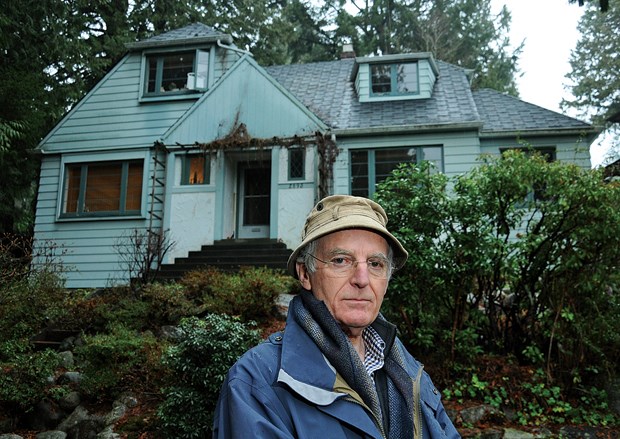When Jennifer Clay got her house assessment in the mail this week, she put off opening it.
“I thought if I open it I won’t sleep, so I’ll open it tomorrow,” said Clay.
Clay, who lives in a heritage house on North Vancouver’s East Eighth Street, had a good idea what was coming. Her property is up more than 20 per cent in value this year – to over $1.4 million. That’s on top of the 10 per cent increase in value last year.
Her home is now worth quadruple what it was when she bought it 20 years ago.
“It’s crazy,” she said. “I have no idea how people buy these houses.”
It’s a similar story in West Vancouver, where Peter Miller has lived in the same modest Dundarave home on Nelson Avenue for the past 25 years.
“My house is a simple old cottage, extended a bit, nothing grand,” said Miller.
In Miller’s case, the assessed value of his property jumped 25 per cent from just over $2 million in 2015 to almost $2.7 million this year.
Others in his Dundarave neighbourhood have reported similar increases – or higher.
Miller, Clay and their neighbours are among the increasing numbers of property-rich on the North Shore, whose skyrocketing assessments have pushed many single-family homeowners into the million-dollar club. But Miller says that won’t do him much good because “we have no intention of selling.”
Miller and Clay aren’t alone. In many Lower Mainland communities, including both North and West Vancouver, residential properties are showing “significant increases from 2015,” said area assessor Jason Grant, with typical single-family homes showing increases of between 15 and 25 per cent. “You would have to go back to 1980 to find only two or three times that assessments have moved this much, this quickly.”
Single-family homes in the Lower Mainland “have been extremely sought after,” said Grant. In contrast, increases to strata properties have risen only between five and 10 per cent.
Increases in West Vancouver have been the most dramatic.
On average, the value of residential properties in West Vancouver is up 17 per cent this year, compared to 6.5 per cent last year. In the District of North Vancouver, average assessments are up 15.5 per cent compared to 5.3 per cent in 2015, while City of North Vancouver properties have averaged an 11 per cent increase compared to 3.3 per cent last year.
But those averages mask some significantly higher increases for owners of single-family homes.
In the city, a single-family 1950s home in the Hamilton area worth $1.2 million last year, for instance, is worth almost $1.5 million this year, an increase of 20 per cent. A Blueridge home built in 1961 worth $895,000 last year would be worth over $1.06 million this year, an increase of 19 per cent.
Last month, B.C. Assessment sent out early notices to more than 2,130 property owners on the North Shore, warning that their assessments would be up significantly more than average for their area.
This week, assessment notices went out to all homeowners, who can also check their assessment online at bcassessment.ca.
Grant said so far B.C. Assessment has received relatively few calls about the assessment notices. “Most people are very aware of what their property is worth,” he said.
Municipal leaders say the soaring assessments are certainly creating a lot of local buzz though. “Every dinner party I go to it’s a topic of conversation,” said Coun. Craig Cameron, acting mayor for the District of West Vancouver. “You wonder where your kids are going to live.”
In response to the rising assessments, the province announced Tuesday the threshold for the full homeowner grant has been bumped up to $1.2 million from $1.1 million last year. The basic grant can reduce property taxes on an owner’s principal residence by $570. But both Miller and Clay say that won’t help them, because their properties are already above that threshold.
Both also worry the spike in their assessments – over the average for their communities – could lead to significantly higher property tax bills.
Miller doesn’t think that’s fair. “It’s paper value,” he said of the increased assessment. “It’s nothing to do with money in your pocket now.”
Municipal leaders point out that increased assessments don’t automatically translate directly into higher taxes. But District of North Vancouver Mayor Richard Walton acknowledged for those on fixed incomes, like seniors, the high value of their property can represent a cash-flow hardship at tax time.
“There’s tons of people who are well into their fixed-income years who couldn’t see this coming,” he said. But tax deferral is one option that can help, he said.
Clay said coming up with the cash is a struggle even for those who are still working. Last year, she lost the homeowners’ grant and paid almost $900 more in taxes than the year before.
Both Miller and Clay say all levels of government need to take a serious look at what’s happening in the housing market with a view to cooling off the double-digit increases.
But Cameron Muir, chief economist for the B.C. Real Estate Association, said looking at the value of single-family homes in the most expensive areas doesn’t accurately reflect the affordability of the real estate market overall.
“The vast majority of people who are buying homes of all types are buying under $1 million,” he said.



